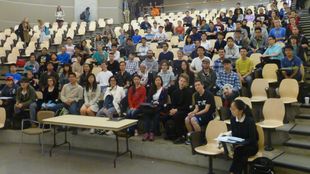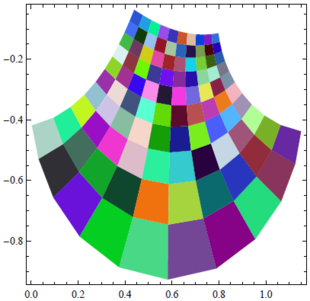14-240/Tutorial-November4
| |||||||||||||||||||||||||||||||||||||||||||||||||||||||||
Boris
Question 26 on Page 57 in Homework 5
Let [math]\displaystyle{ a \in R }[/math] and [math]\displaystyle{ W = \{f \in P_n(R): f(a) = 0\} }[/math] be a subspace of [math]\displaystyle{ P_n(R) }[/math]. Find [math]\displaystyle{ dim(W) }[/math].
First, let [math]\displaystyle{ f(x) \in W }[/math]. Then we can decompose [math]\displaystyle{ f(x) }[/math] since there is a [math]\displaystyle{ g(x) \in P_{n - 1}(R) }[/math] such that [math]\displaystyle{ f(x) = (x - a)g(x) }[/math]. From here, there are several approaches:
Approach 1: Use Isomorphisms
We show that [math]\displaystyle{ W }[/math] is isomorphic to [math]\displaystyle{ P_{n - 1}(R) }[/math]. Let [math]\displaystyle{ B = \{1, x, x^2, ..., x^{n - 1}\} }[/math] be the standard ordered basis of [math]\displaystyle{ P_{n - 1}(R) }[/math] and [math]\displaystyle{ S = \{x - a, (x - a)x, (x - a)x^2, ..., (x - a)x^{n - 1}\} }[/math] be a subset of [math]\displaystyle{ W }[/math]. Then there is a unique linear transformation [math]\displaystyle{ T:P_{n - 1} \to W }[/math] such that [math]\displaystyle{ T(f(x)) = (x - a)f(x) }[/math] where [math]\displaystyle{ f(x) \in B }[/math]. Show that [math]\displaystyle{ T }[/math] is both one-to-one and onto and conclude that [math]\displaystyle{ dim(P_{n - 1}) = dim(W) }[/math].
Approach 2: Use the Rank-Nullity Theorem
Let [math]\displaystyle{ K = \{1, x, x^2, ..., x^{n - 1}, x^n\} }[/math] be the standard ordered basis of [math]\displaystyle{ P_n }[/math] and [math]\displaystyle{ f(x) \in P_{n}(R) }[/math]. Then [math]\displaystyle{ f(x) = \displaystyle\sum_{i=1}^{n} c_ig_i(x) }[/math] where [math]\displaystyle{ c_i \in R }[/math] and [math]\displaystyle{ g_i(x) \in K }[/math]. Define [math]\displaystyle{ T: P_{n}(R) \to R }[/math] by [math]\displaystyle{ T(\displaystyle\sum_{i=1}^{n} c_ig_i(x))= \displaystyle\sum_{i=1}^{n} c_ig_i(a) }[/math]. Then it is easy to show that [math]\displaystyle{ T }[/math] is both well-defined and linear. Afterwards, show that [math]\displaystyle{ rank(T) = 1 }[/math] and use the rank-nullity theorem to conclude that [math]\displaystyle{ dim(W) = n }[/math].
Approach 3: Find a Basis with the Decomposed Polynomial
This approach is straightforward. Show that [math]\displaystyle{ S = \{x - a, (x - a)x, (x - a)x^2, ..., (x - a)x^{n - 1}\} }[/math] is a basis of [math]\displaystyle{ W }[/math].
Approach 4: Find a Basis without the Decomposed Polynomial
This approach requires a little more cleverness when constructing the basis: [math]\displaystyle{ S = \{x - a, (x^2 - a^2), (x^3 - a^3), ..., (x^n - a^n)\} }[/math].
Cite Carefully
Boris's Section Only
If you use in your proof Corollary 1 of the Fundamental Theorem of Algebra, then please cite it as "Corollary 1 of the Fundamental Theorem of Algebra". Do not cite it as the "Fundamental Theorem of Algebra" since that means you are citing the fundamental theorem instead of its corollary.

